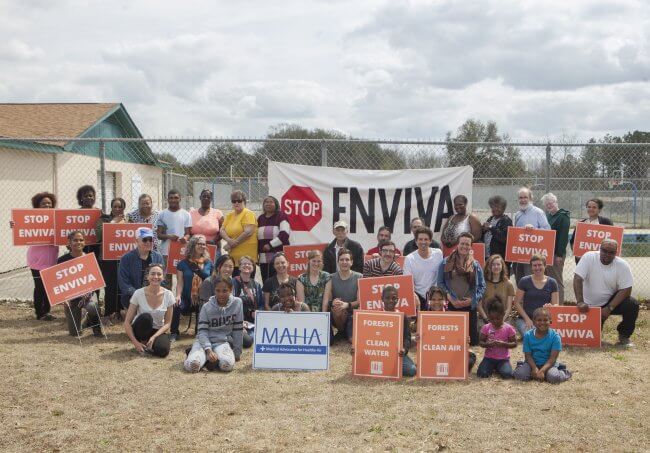“Biomass” may sound like a clean idea, but it actually means cutting down and turning trees into fuel pellets to be burned for energy — creating more carbon pollution than coal, accelerating global warming, and driving climate chaos.
North Carolina’s former governor opened the floodgates to the wood pellet export industry. It tears down the very trees that capture carbon pollution and protect people’s health and quality of life, making wood pellets for export where they are burned in power stations to generate electricity.
Enviva, the world’s largest wood pellet exporter, already operates three mills in North Carolina. These mills have been the subject of mounting scientific and community evidence documenting that wood pellets are bad for the climate and a dirty and destructive fuel. As with other dirty fuel industries, the wood pellet industry disproportionately impacts our most vulnerable, including low-income and communities of color.
Now Enviva is proposing to build their fourth wood pellet biomass facility in the town of Hamlet in rural Richmond County. Fifty acres of forests a day in North and South Carolina would be turned into pellets and then shipped to Europe to burn for electricity. This community is already dealing with pollution and environmental injustice due to other polluting industries and has been ranked 90 out of 100 counties in the State of North Carolina for health outcomes.
The air permit issued to Enviva under the last administration by the NC Department of Environmental Quality contained false information regarding the plant’s location and violated air quality regulations, yet no public hearing was ever held and the citizens in the affected community were not given proper notice or opportunity to comment.
Neither the local citizens nor the state of NC needs another wood pellet mill. The health and economic impacts would be devastating, and the community doesn’t want it. A victory in Richmond County is a victory for the South, for the forests, and for all the communities in the South who face environmental injustice.
In addition to NC Interfaith Power & Light’s support for clean energy, we recognize we must put the protection of our forests and the health, safety, and prosperity of our most vulnerable communities at the forefront of North Carolina’s climate agenda.
Click here to sign a letter to Governor Roy Cooper and DEQ Secretary Michael Regan to show we faithfully stand with the citizens of Richmond County to stop this facility from being built.

